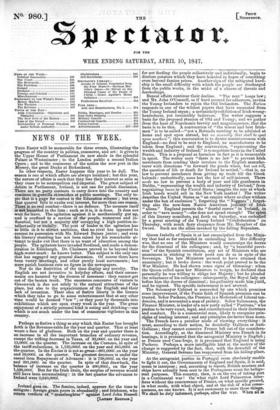Queen Isabella of Spain is at last emancipated from the
Minis- try that had so far succeeded in enthralling her. Her difficulty was, that no one of the Ministers would countersign the decree for the dismissal of his colleagues ; and, by "a beautiful provi- sion" of the Spanish constitution, any set of Ministers who are unanimous in sticking to their posts can do so in spite of the Sovereign. The late Ministers seemed to have attained that unanimity ; but it broke down : the weak point proved to be the War Minister. He had shown some signs of trimming : when the Queen called upon her Ministers to resign, he declared that personally he was willing to oblige her Majesty ; but he pleaded the reluctance of his colleagues : subsequently, the Royal lady set before him the decree of dismissal ; his gallantry made him yield, and he signed. The specific inducement is not avowed.
The Sotomayor Cabinet is succeeded by one which promises some improvement, if the Punic faith of Spanish promises can be trusted. Setior Pacheco, the Premier, is a Moderado of Liberal ten- dencies, and is accounted a man of probity. Seiior Salamanca, the Finance Minister, is leader of a new party called" Puritans," who profess to be very exact, legal, and constitutional in their doctrines and conduct. He is a commercial man, likely to recognize prin- cipleS of trading interest ; and any principles are better than none- The French have a peculiar mode of viewing everything : it must, according to their notion, be decidedly Gallican or Anti- Gallican ; they cannot conceive France left out of the considera- tion. Accordingly, as the dismissed Ministry was French in its leanings, it is presumed that the antagonist Ministry is English ; as France used Casa-Irujo, it is presumed that England is using Pacheco. Perhaps a more intelligible hint at the motive of the change is suggested by the fact, that, with the downfall of the Ministry, General Serrano has reappeared from his hiding-place.


























